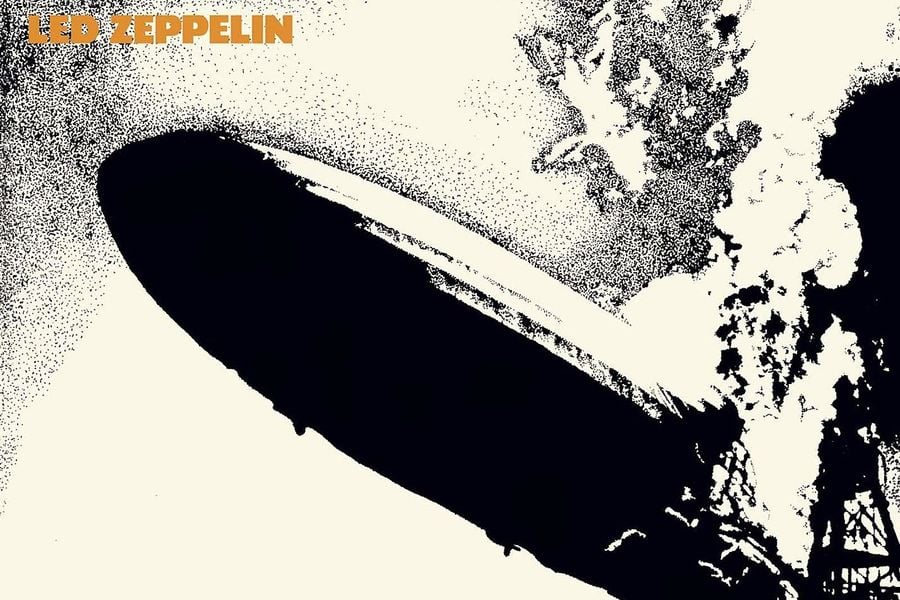
(Credits: Far Out / APA Agency / Dina Regine)
Thu 30 October 2025 4:00, UK
Led Zeppelin harboured every talent necessary to birth heavy metal.
Jimmy Page had already proven himself wildly virtuous on the guitar during his time as a session musician, reimagining the instrument’s capabilities. John Paul Jones played the bass with a similar curiosity, setting the foundation in each song that echoed its underlying mood. Robert Plant sang with an intensity that remains unrivalled, his vocals sounding practically inhuman at their peak, while John Bonham played the drum kit like a man possessed, gifting a new meaning to drummers being the ‘backbone’ of a band.
Most are well aware of Led Zeppelin’s wide-spanning impact, found in every corner of rock music since 1969. They did, in fact, begin to define the ‘rock god’ archetype, but, talents assured, their beginning was anything but conventional.
Early on, Led Zeppelin were granted a creative freedom that was unheard of, in part due to Page’s established reputation, but it soon became clear why: their self-titled debut in 1969 showed the four-piece to be a group beyond the conventions of a typical rock group. Each track became its own epic, expansive in scope and wildly immersive. Whether the song was like the scornful heartbreak tale of ‘Good Times, Bad Times’ or a rendition of a classic such as ‘Dazed and Confused’, Led Zeppelin proved a cinematic take across the record, one that only grew in time across their discography.
Like many of their contemporaries, each musician was largely inspired by the rhythm and blues, heard in the likes of Plant’s wails or Page’s penchant for improvisation, but where Zeppelin differed was in the heaviness that lurked underneath.
 The self-titled debut album artwork. (Credit: Press)
The self-titled debut album artwork. (Credit: Press)
Their debut is the definitive precursor to heavy metal in its complete reinvention of the rock genre, which, from its inception, warranted a sense of rebellion. Led Zeppelin, however, channelled this rebellion into something increasingly enticing and dangerous, taking its guitar-driven sound and visualising an even bigger concept. What if the sound were larger? More imposing? Why not grant equal weight to every instrument, rather than let one dominate and guide the rest? These frameworks advised Page in the studio when piecing together the debut’s sound and, in turn, yielded unexpected results.
Speaking with MusicRadar, he explained the source of their debut’s raw sound, noting, “I was acquainted with John Paul Jones’ playing as a session player, but John Bonham, with his approach to the drums and the dazzling technique that he had, the overall sound of his drums was unlike anybody that I’d heard before. It was so musical because he knew how to tune his drums. So I knew instinctively what I wanted to do with Led Zeppelin was unlike anybody else. I wanted to have the full stereo picture, the placing of the instruments.”
Intriguingly, Page foretold Bonham’s lasting proficiency, seeing a commanding presence in the drummer’s wild genius. He transmitted an energy into every beat that many have tried to replicate since, to no avail, manipulating his kit to conjure a new spirit with each performance. In a world where drummers are often relegated to the back of the stage, loyal yet unrecognised, Bonham commanded attention, and his bandmates were wise enough to grant it to him.
Page’s vision to envelop the listener in Led Zeppelin’s world proved to be one of rock‘s greatest innovations. In the genre’s tradition, which often produces an overwhelming sonic landscape, the band sought a balance that amplified each musician, bringing every note, chord and word to the spotlit forefront.
Commenting on the epic nature of the majority of their songs, Page likened it to the absence of singles during the band’s career, explaining, “There was another reason to make them longer and longer: there was more to say in them. Then again, it could be argued the other way. ‘Good Times, Bad Times’ is really short, as far as minutes and seconds, but there’s just so much that goes on in that. It is what it is. Sometimes you have shorter statements. Sometimes you need longer to get across what you’re doing.”
His approach has become one of the most enticing factors in heavy metal: the complete submersion in a sound that, to some, may seem abrasive, but to others, is a masterful display of technique merged into one great sonic landscape.
Related Topics
The Far Out Led Zeppelin Newsletter
All the latest stories about Led Zeppelin from the independent voice of culture.
Straight to your inbox.

